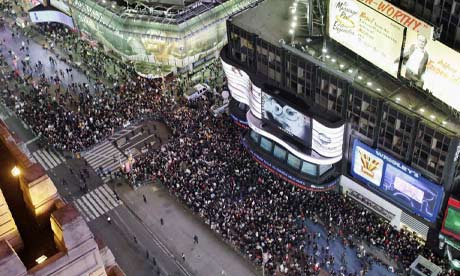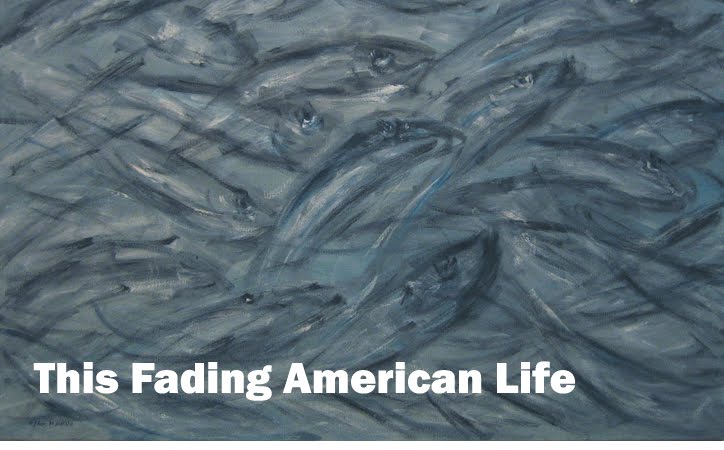There were many similarities and differences. Since I was in college then, and participated the sit-in for about 24 hours in late May that year, I have personal memory to abet my analysis below.
First, let's see the still developing and forming movement of the "Occupying Wall Street". According to occupywallst.org, the de facto online resource for the ongoing protests happening on Wall Street,
Occupy Wall Street is a horizontally organized resistance movement employing the revolutionary Arab Spring tactic to restore democracy in America. We use a tool known as a "people's assembly" to facilitate collective decision making in an open, participatory and non-binding manner. We call ours the NYC General Assembly and we welcome people from all colors, genders and beliefs to attend our daily assemblies.It is fair to say, that the economic woes, amongst the young people in particular, were the immediate triggers behind the "Arab Spring" and "Occupying Wall Street" (OWS), either one blame this condition on ruthless despots in Mideast, or greedy bankers sucking blood on the nation and the middle class and the poor in the US, aided by political structures to maintain the status quo profitable for a handful few - perhaps not just the top 1%, as argued by economist Paul Krugman.
The current unemployment rate is really high and it is much higher amongst the young people. The unemployed, in general, are not to be blamed for their conditions. It was the greedy Wall Street bankers, recklessly drove the nation and the world to the brink of collapse, aided again and again by the political establishments from both parties and bailed out by the government who labeled them "too big to [allow] fail".
In 1989, when Chinese students hit the streets and occupied Tiananmen Square in Beijing, they were motivated by both a demand for better economic future for themselves, and an open, democratic system which would reverse the economic foe they were facing upon graduation. Since late 1980s, the income amongst intellectuals in China was seriously behind labors and the resentments amongst college students were extremely high, since they were confronted with the reality that their salaries would be much lower than their allowances their parents gave them while in colleges. Just like here, it was the political structure created such unstable and unacceptable situation for people, therefore the youths rebelled.
Thus the similarity.
There is a major difference. In 1989, the student movement had a clear leadership circle, who made many concrete demands which could be implemented, amongst the general calls for democracy, while OWS seems somewhat headless and made no concrete demands.
The reason behind this major different is that China had a highly centralized government and major decisions were made by a handful of people; while the U.S. is a decentralized government with several branches and levels, and no domineering political forces which can dictate an immediate change. Therefore, the tactics the OWS people has adopted, namely building a movement, not dissimilar to the Tea Party movement, is more appropriate. It would grow, once more and more people hear their voices and realized that they were indeed also belong to that disenfranchised 99% (or 90%, argued by Krugman), and eventually, some sympathetic but timid, or opportunistic politicians.
This is not a class war declared on the wealthy or the act of jealous. Just as in 1989, the Chinese students had no intention to overthrow the government, but to redress the wrongs in the hands of the lopsided policies and the political structures allowed no voices from them to be heard.
Rather, OWS people are pointing out the failure of the laissez-faire capitalism and the illusion of all people got rich with the wealth trickles down from the top. In the pass, masked by the rising housing prices and the easy credits, majority of middle classes or even lower classes felt they had indeed drunk on the trickled down spring water. After the economic crisis, some of them finally realized that they had not been drinking any vintage but bitter pomace juice. What OWS people are trying to do, is to waken the rest up and see clearly the inequality and unfairness guaranteed by this failed and failing laissez-faire capitalism and its lackey - the main political parties, the politicians and the officials, up to current supreme court.
Some super rich people still jeer at the OWS protesters. They claimed that what they demand is the failed socialism. Well? No system or ism is fault free and since the laissez-faire capitalism is ailing severely, people should not be deterred by labels from explore good ideas from other forms of government.
In the U.S., it is one dollar one vote now. The middle class and the poor have ever diminishing voices. The political apparatuses are closed to them. Even President Obama was not willing or able to change the situation. I'd say unwilling.
The disenfranchised people's anger is pointing at as much Wall Streets as its enablers. When Obama claimed that those banking institution who brought the nation to its knees by their reckless gaming as "too big to [allow] fail", he instantaneously became their partner in crime. His omitting the word "allow", disingenuously covered up the fact that it was the governmental decision to bail these institutions up at the expenses of the middle class and the poor, to pump blood into them to keep them alive and continue to exploit and to speculate, and hide the fact that the government could have demand more oversight of these speculators and more regulations to prevent the repeat.
People have no place to go but the street. One only wonders what takes it so long and if the politician would heed their voices and try to correct the wrongs.

Occupy Wall Street protesters take part in a demonstration at Times Square in New York. Photograph: Eduardo Munoz/Reuters





No comments:
Post a Comment